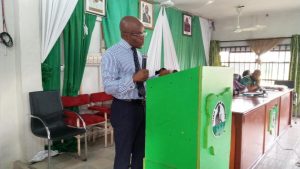A senior lecturer in the Nigerian University has taken a swipe at NTA International for showing how to prepare ogbono soup while dodging the coverage of momentous shooting of unarmed protesters by suspected soldiers at Lekki Tollgate in Lagos State.
Nsikak Solomon Idiong, the Political Communication and Media Studies teacher at the Department of Communication Arts, University of Uyo, Akwa Ibom State, hailed some independent television stations in the country for the coverage of the momentous #ENDSARS that has attracted global attention to the gruesome murder of unarmed protesters.

Idiong, a holder of PhD in Mass Communication, said “However, nobody expects a news organization to dodge a momentous event as the Nigerian Television Authority did when NTA International showed how to prepare ogbono soup while soldiers were shooting at protesters in Lagos.”
Speaking on the topic: Towards Symbiosis: Reflections on Government/Media Relations in Nigeria at NUJ Press Centre, Information Drive, Uyo on Friday, the lecturer remarked “Nowadays, nobody expects a reporter to narrate the news like an automation, without colour and without style.”
He posited “Such journalists are to be found in many newsrooms today- such a newsroom as, to cite one example, that of Arise News, a television station that has risen to national prominence in the aftermath of the #ENDSARS protests, boldly relaying to a horrified world the firsthand testimonies of witnesses who attested to the homicidal atrocities perpetuated by a rogue army against peaceful demonstrators at Lekki Too gate in Lagos on the night October 20, 2020.
“To watch Arise News during that episode and in the days that followed was to be reminded of some of the best journalism of Martha Gellhorn, one of the great war correspondents of the 20th century, who, while serving on the reportorial staff of Coller’s Weekly, popularized an austere style that demanded telling the story with few adornments, with vividness, and with fidelity to the facts,” Idiong hailed.
On the journalism practice, he argued “To assess the journalism profession in Nigeria today is to acquaint oneself with all that is commendable as well as all that is deplorable, even contemptible, about the news vocation.
“One will find in Nigerian journalism abundant specimens of ‘that serious-minded, civic-spirited and reflective news gathering and …commentary (that we need) to have if, in this dangerous world, we are to combine caution, resolution and longevity.
“Among Nigerian journalists, there are many – I dare say a majority- who will strive to practise a journalism that is truthful, faithful to the facts, bearing witness of human actuality to readers, viewers and listeners, and then matching the story with adequate feelings and moral judgment.”

